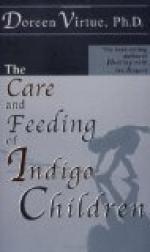The appetite of a perfectly normal infant usually is; but overeating is a habit gradually acquired and may continue until twice as much food as is proper is taken in the twenty-four hours. This habit is most frequently seen in infants whose digestion is not quite normal; because of the temporary relief from discomfort experienced by taking food into the stomach, they often appear to be hungry the greater part of the time, especially at night.
What are the causes of overfeeding?
The most common one is the habit of watching the weight too closely, and the conviction on the part of the mother or nurse that because a child is not so large nor gaining so rapidly as some other infant of the same age, more food or stronger food should be given.
What harm results from overfeeding?
All food taken in excess of what a child can digest becomes a burden to him. The food lies in the stomach or bowels undigested, ferments, and causes wind and colic. When overfeeding is longer continued, serious disturbances of digestion are soon produced. The infant is restless, fretful, constantly uncomfortable, sleeps badly, and stops gaining and may even lose in weight. Such symptoms may lead to the mistaken conclusion that too little food is given, and it is accordingly increased, when it should be diminished. One of the results of long-continued overfeeding is dilatation or stretching of the stomach.
What should guide one as to the quantity of food to be given to any infant??
(1) The size of the infant’s stomach at the different months; (2) the amount of milk which the healthy nursing infant gets; (3) the quantities with which most children do best. The table of quantities and intervals of feeding, on page 108, gives the average figures derived from these sources. It is seldom wise to go beyond the limits there stated; nor should one insist upon giving any fixed amount if it is clearly more than the child wants or can be made to take except by continued coaxing.
LOSS OF APPETITE
What is to be done when without any other signs of illness a child’s appetite gradually fails?
This is often the result of a long period of overfeeding or the use of milk too rich in fat. If in all other respects the child seems well and simply does not want his food, it should be offered at regular hours, but not more frequently; on no account should he be coaxed, much less forced, to eat, even though he takes only one half or one third the usual quantity. The intervals between feedings should not be shortened but rather lengthened. Often, with a child a year old, it is necessary to reduce the number of feedings to four or even three in twenty-four hours. Water, however, may be offered at more frequent intervals. The food should be weakened rather than strengthened. No greater mistake can be made than, because so little is taken, coaxing or forcing food at short intervals through fear lest the child may lose weight.




